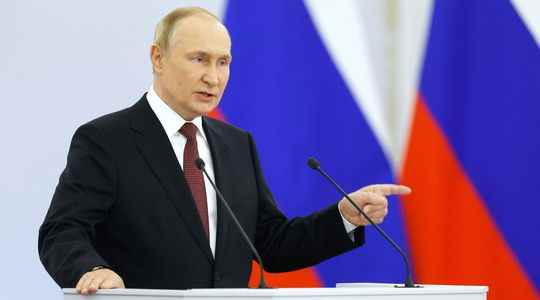It’s a little music, haunting and insidious, which has been rising for several weeks in the Western camp: the Russian-Ukrainian war has lasted long enough, it’s time to negotiate. Let’s not give Ukraine any more “blank cheques”, declared Republican MP Kevin McCarthy on 18 October. “We urge you to make vigorous diplomatic efforts”, write to Joe Biden, six days later, about thirty Democratic deputies, even suggesting to him (before retracting) to lighten the sanctions to encourage Putin to negotiate! In France too, voices are being heard. In the wake of Emmanuel Macron who, in Brussels on October 21, hopes for negotiations “as soon as possible”, the debate is raging in the Senate. Let’s not give up “the demand for the fastest possible ceasefire on the front”, asks the elected communist Pierre Laurent, on October 26, while his colleague (LR) Philippe Bas proposes to go “from a ceasefire to a truce, and from a truce to the opening of peace negotiations” to “avoid the escalation of terror”.
Fear of a lasting recession, energy crisis, extension of the conflict to NATO countries, without forgetting the nuclear risk… Their arguments, legitimate although a bit selfish, nevertheless conceal a central question: to speak to stop fighting make sense today?
“We are still in the time of war”, recently reminded L’Express Jean-Yves Le Drian, former Minister of Foreign Affairs. And it is not the chancelleries that will decide the peace, but the battlefield. Because to end a war, two conditions are needed, in principle: a vanquished who accepts the fate of arms and a victor who agrees to negotiate with him. We are far from it.
“Putin has not deviated from his initial objectives”
Although his army, beaten in kyiv and then Kharkiv, has been unable to regain an inch of ground since the summer, Vladimir Putin still thinks he can win, observes Branislav Slanchev, a political scientist at the University of San Diego ( California): “He is gathering new troops in the Lugansk region and has not deviated from his initial objectives. It doesn’t matter that he has no chance of succeeding, he believes in it.”
Opposite, the troops of Volodymyr Zelensky continue their reconquest. In the south, they are approaching the strategic city of Kherson, the loss of which would deal a very heavy blow to the Russians. And then ? What choice – if not to continue – have the Ukrainians, confronted with an enemy who wants to exterminate them? Evidenced by this mind-blowing sentence, published on June 7 by Dmitri Medvedev, the former Russian president: “They are bastards and degenerates (…). As long as I am alive, I will do everything I can for them. make it disappear.” “It is to believe that an apocalyptic delirium is taking hold of some of the Russian leaders, as at the end of the Third German Reich”, comments Stéphane Courtois, author, with Galia Ackerman and other specialists , a masterful work on Vladimir Putin.
At this stage, any negotiation is therefore excluded and there is no hope that it can take place in the near future. The Ukrainian president will never speak to his enemy until he has recovered the territories that have come under Russian control. “He has no interest in doing so, judges former diplomat Pierre Vimont. He has the advantage on the ground. Ukrainian people will not accept it. Opposite, the Russian president has a good game to say that he is ready to negotiate, he has everything to gain!
Calls for negotiation suit the head of the Kremlin
Far from a ceasefire, everything therefore raises fears, on the contrary, of a hardening. If he continues to lose ground, Putin will have no choice but to continue his headlong rush, as he would hardly survive a total rout. “There is no example in Russian history of a big defeat that did not lead to a change of regime, underlines French general Michel Yakovleff. There is no reason for his regime to make exception.”
In his book “War and Punishment” (Princeton University Press), Hein Goemans, a researcher at the University of Rochester, establishes a link between the profile of leaders and the way they emerge from conflict. The most dangerous, he says, are the “hardliners”, who know that if defeated, internal forces will cause their downfall. From the start of the First World War, the German Emperor Wilhelm II understood that he did not have the means to win it. Nevertheless, he fought for four years, because he knew he would be overthrown if he backed down.
Does Putin feel threatened? Difficult to say, so opaque is Russian power. But he is still far from having lost. Opposite, the Ukrainians are condemned to victory. The time of war is not about to end. And the current calls for negotiation are above all the business of the head of the Kremlin, who sees in them the perfect opportunity to divide this much hated West.
